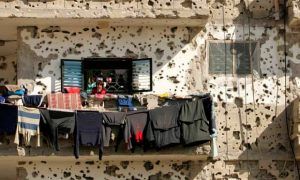Ben Ehrenreich in The Guardian:
 There has been nothing so dramatic as a “war” in the Gaza Strip since 2014, but the Israeli military has nonetheless killed more than 200 Palestinians there this year. On a single Friday in March, snipers took the lives of 52 protesters. Most weeks, the casualties dribble in more slowly: two or three or seven are shot while demonstrating along the fence that confines them; or, unsuspecting, they are blown apart by missiles fired from drones and F16s. Only when the toll is particularly high, or an unusual proportion of the dead are children, do the international media take notice. Then there is the siege that Israel has imposed on the territory since Hamas took power in 2007 and the many deaths that this has more obliquely caused – along with the shortages of nearly all goods necessary for survival, regular power outages and lack of drinking water. Most Gazans are unable to travel even for emergency medical care outside the narrow boundaries of the Strip, generating a sense of suffocation and despair. You may have skimmed an article reporting that the UN predicted, in 2015, that the privations of the siege could render Gaza “uninhabitable” by 2020, which is no longer far away. Depending on your political orientation, you may choose to focus on Hamas’s failures of governance and fundamentalist rigidities, on rockets fired into Israel, on “terror kites” and “terror tunnels”. Taken together, this is the world’s image of Gaza: a place of violence, hopelessness, extremism and death. It is not inaccurate, but it is profoundly incomplete.
There has been nothing so dramatic as a “war” in the Gaza Strip since 2014, but the Israeli military has nonetheless killed more than 200 Palestinians there this year. On a single Friday in March, snipers took the lives of 52 protesters. Most weeks, the casualties dribble in more slowly: two or three or seven are shot while demonstrating along the fence that confines them; or, unsuspecting, they are blown apart by missiles fired from drones and F16s. Only when the toll is particularly high, or an unusual proportion of the dead are children, do the international media take notice. Then there is the siege that Israel has imposed on the territory since Hamas took power in 2007 and the many deaths that this has more obliquely caused – along with the shortages of nearly all goods necessary for survival, regular power outages and lack of drinking water. Most Gazans are unable to travel even for emergency medical care outside the narrow boundaries of the Strip, generating a sense of suffocation and despair. You may have skimmed an article reporting that the UN predicted, in 2015, that the privations of the siege could render Gaza “uninhabitable” by 2020, which is no longer far away. Depending on your political orientation, you may choose to focus on Hamas’s failures of governance and fundamentalist rigidities, on rockets fired into Israel, on “terror kites” and “terror tunnels”. Taken together, this is the world’s image of Gaza: a place of violence, hopelessness, extremism and death. It is not inaccurate, but it is profoundly incomplete.
Asmaa al-Ghoul, who was born in the Rafah refugee camp at the southern end of the Strip, writes with clarity and tenderness of these realities and others that are less widely reported. Despite it all, she insists: “People continued to laugh in Gaza.” Her own laughter bubbles through the pages of A Rebel in Gaza: a stubborn, defiant joy in living, as keen as her rage or her grief. Ghoul, who has travelled widely and lived abroad, understands why so many of her friends have chosen to emigrate, but the cities of the west, “oozing with indifference”, hold little attraction for her. Her Gaza is a place of suffering but also of magic, as if its isolation and its privations bring the humanity of its inhabitants into sharper relief. “Life in Gaza has a strength that makes you feel that death doesn’t exist,” Ghoul writes. “Except in war.”
More here.
